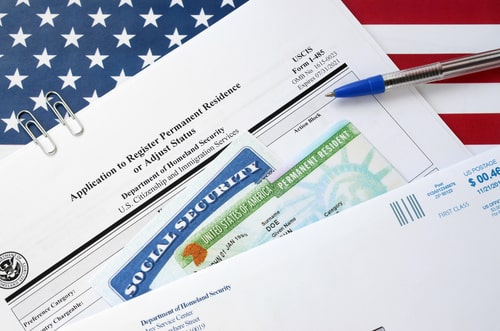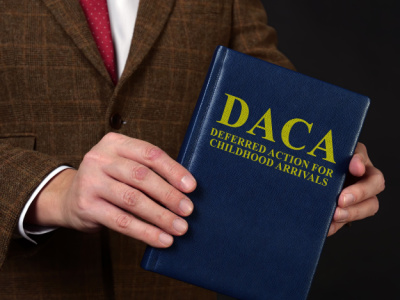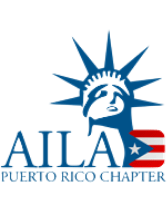Recent Blog Posts
Three Kinds of Temporary Work Visas in Florida
 Moving to Florida to work can be exciting, but you need the right visa. Temporary work visas allow people from other countries to work in the U.S. for a limited time. There are three types of temporary work visas individuals should know about H Visas, L Visas, and E Visas. Each one has different rules. An attorney can assist you in deciding which temporary work visa makes the most sense for you.
Moving to Florida to work can be exciting, but you need the right visa. Temporary work visas allow people from other countries to work in the U.S. for a limited time. There are three types of temporary work visas individuals should know about H Visas, L Visas, and E Visas. Each one has different rules. An attorney can assist you in deciding which temporary work visa makes the most sense for you.
H Visas: For Skilled Workers
The H Visa is for people who have special skills. There are different kinds of H Visas:
-
H-1B Visa – This is for workers in jobs like tech, engineering, or medicine. You need a job offer and a college degree.
Three Crimes That May Prevent You from Immigrating to the United States
 Immigrating to the United States can be a dream for many people around the world. However, certain criminal convictions on your record can stand in your way of making it a reality. It is important to understand these crimes and how they can affect your immigration application. If you are concerned about a criminal conviction you believe may make you ineligible for immigrating to America, contact a lawyer for assistance.
Immigrating to the United States can be a dream for many people around the world. However, certain criminal convictions on your record can stand in your way of making it a reality. It is important to understand these crimes and how they can affect your immigration application. If you are concerned about a criminal conviction you believe may make you ineligible for immigrating to America, contact a lawyer for assistance.
Drug-Related Offenses
One of the most common reasons for being denied entry into the United States in 2024 is having a drug-related offense on your record. This can include possessing, selling, or manufacturing illegal drugs. The U.S. government takes drug crimes very seriously and has strict laws against them. Even if the drug offense was minor and happened years ago, it could still impact your ability to immigrate.
Requirements for Immediate Relative Visas in Florida Immigration Law
 If you want to bring a close family member to the United States while living in Florida, an immediate relative (IR) visa may be a good option. These visas are for close family members of U.S. citizens and do not have yearly limits, which makes them quicker to obtain compared to other family-based visas. To make sure you understand the requirements and documents needed for an IR visa, contact an immigration lawyer.
If you want to bring a close family member to the United States while living in Florida, an immediate relative (IR) visa may be a good option. These visas are for close family members of U.S. citizens and do not have yearly limits, which makes them quicker to obtain compared to other family-based visas. To make sure you understand the requirements and documents needed for an IR visa, contact an immigration lawyer.
Who Qualifies for an IR Visa?
IR visas are for close family members of U.S. citizens. The eligible categories are:
-
IR-1 – Spouses of U.S. citizens.
-
IR-2 – Unmarried children under 21 of U.S. citizens.
-
IR-3 – Orphans adopted abroad by U.S. citizens.
Everything You Need to Know Regarding Green Cards
 If you are an immigrant looking to live and work in the United States, obtaining a green card is a significant step toward making your goals a reality. A green card, also known as a Permanent Resident Card, grants you the legal right to live and work in the U.S. permanently. Here are the key things you should know about green cards and how an immigration attorney can help you achieve your goals.
If you are an immigrant looking to live and work in the United States, obtaining a green card is a significant step toward making your goals a reality. A green card, also known as a Permanent Resident Card, grants you the legal right to live and work in the U.S. permanently. Here are the key things you should know about green cards and how an immigration attorney can help you achieve your goals.
At Vasquez Law Firm, PLLC, our Spanish-speaking attorneys are ready to handle every part of your case. We understand the excitement many feel as they look to build a life for themselves in the United States. When clients hire us, they can feel confident knowing we will do everything we can to assist them in making their goals of pursuing the American dream a reality.
Understanding Green Cards
A green card is a legal document that proves your status as a lawful permanent resident of the United States. A green card allows you to live and work in the country indefinitely, enjoy certain rights and benefits, and eventually apply for U.S. citizenship if you meet the eligibility requirements.
Navigating Immigration Challenges for Same-Sex Couples in Florida
 If you are a same-sex couple in Florida facing immigration challenges, it is important to know that you have options. To learn what these options are, contact a local immigration attorney. By contacting an attorney, you can ensure that you and your significant other understand what options are available to you and then make the decision that best fits your circumstances.
If you are a same-sex couple in Florida facing immigration challenges, it is important to know that you have options. To learn what these options are, contact a local immigration attorney. By contacting an attorney, you can ensure that you and your significant other understand what options are available to you and then make the decision that best fits your circumstances.
At Vasquez Law Firm, PLLC, our Spanish-speaking team of qualified attorneys offers honest and reliable representation to those facing immigration challenges in Florida. If you need immigration help, give us a call to get started on your case.
Understanding Immigration Laws for Same-Sex Couples
In 2013, the U.S. Supreme Court and President Obama directed the U.S. Citizenship and Immigration Services to review immigration visa petitions in the same way opposite-sex visa petitions are reviewed. This landmark moment in United States history paved the way for immigrants in same-sex relationships, in Florida and across the country, to have the right to sponsor his or her partner for a green card or other immigration benefits, just like opposite-sex couples.
What to Know About Applying for a Waiver of Inadmissibility in Florida
 If you are trying to figure out how to get permission to enter the United States but find the rules in Florida confusing, you are not alone. Even though it may be hard, it is important to know about different ways you can apply for a waiver. This is true for people who are already in the U.S. and people who want to come into the U.S. but are not here yet.
If you are trying to figure out how to get permission to enter the United States but find the rules in Florida confusing, you are not alone. Even though it may be hard, it is important to know about different ways you can apply for a waiver. This is true for people who are already in the U.S. and people who want to come into the U.S. but are not here yet.
There are special rules for people who have been in the U.S. without permission, those who need protection because they are in danger, and victims of violence or human trafficking. It is always a good idea to work with a lawyer who knows a lot about immigration laws to help you through this process.
Our team at Vasquez Law Firm, PLLC is made up of experienced immigration lawyers who are ready to help people in Florida with their immigration needs. We are here to give you the detailed advice you need, no matter how complicated your situation is.
What Happens if I Get Divorced After Getting a K-1 Fiancé Visa?
 Getting married is a significant milestone in life, and for couples who live in different countries, marriage may require them to navigate the complexities of immigration law. In situations where one partner is a U.S. citizen, and the couple wants to live together in the United States, the couple may need to apply for a K-1 fiancé visa. If an application is approved, the K-1 visa will allow the foreign fiancé to enter the country with the intention of getting married within 90 days. However, what happens if the couple gets divorced after obtaining the K-1 visa? An experienced immigration attorney can provide guidance in these situations, helping a foreign fiancé or spouse understand what options may allow them to continue living in the United States.
Getting married is a significant milestone in life, and for couples who live in different countries, marriage may require them to navigate the complexities of immigration law. In situations where one partner is a U.S. citizen, and the couple wants to live together in the United States, the couple may need to apply for a K-1 fiancé visa. If an application is approved, the K-1 visa will allow the foreign fiancé to enter the country with the intention of getting married within 90 days. However, what happens if the couple gets divorced after obtaining the K-1 visa? An experienced immigration attorney can provide guidance in these situations, helping a foreign fiancé or spouse understand what options may allow them to continue living in the United States.
K-1 Fiancé Visa Overview
A K-1 fiancé visa allows foreign nationals who are engaged to be married to enter the United States for that purpose. The U.S. citizen fiancé(e) will file Form I-129F, Petition for Alien Fiancé(e), with U.S. Citizenship and Immigration Services (USCIS). The foreign fiancé(e) will be required to attend an interview at a U.S. embassy or consulate, and once their visa is approved, they will receive authorization to enter the United States.
When Is an Immigrant Eligible for an Adjustment of Status?
 For immigrants who are currently living in the United States, the process of obtaining legal permanent residency, also known as a Green Card, can be complex and confusing. One potential pathway to obtaining a Green Card is through an adjustment of status. This option allows certain eligible immigrants to change their immigration status from nonimmigrant to immigrant without having to leave the country. An attorney with experience in immigration law can help immigrants and their family members determine when this option may be available, and they can provide legal support during the process of applying for a Green Card.
For immigrants who are currently living in the United States, the process of obtaining legal permanent residency, also known as a Green Card, can be complex and confusing. One potential pathway to obtaining a Green Card is through an adjustment of status. This option allows certain eligible immigrants to change their immigration status from nonimmigrant to immigrant without having to leave the country. An attorney with experience in immigration law can help immigrants and their family members determine when this option may be available, and they can provide legal support during the process of applying for a Green Card.
What Is an Adjustment of Status?
An adjustment of status allows eligible immigrants who are in the United States to apply for lawful permanent residency or a Green Card without being required to return to their home countries. This can save time and money compared to applying for a visa at a U.S. consulate abroad.
Can Immigrants Affected by Climate Change Claim Asylum?

In recent years, the issue of climate change has become a pressing concern worldwide. Rising sea levels, extreme weather events, and other environmental factors have forced many people to leave their homes in search of safety and security. This raises an important question: can immigrants affected by climate change claim asylum and receive protection against deportation from the United States? An experienced attorney can provide guidance on this issue, and they can represent immigrants in legal proceedings related to asylum.
What Is Asylum?
Asylum is a form of protection that may be granted to immigrants who have experienced persecution in their home countries or have a credible fear that they will suffer persecution based on their religion, nationality, race, political opinions, or membership in certain groups. If an asylum request is granted, a person will be allowed to remain in the United States, and they may receive authorization to work in the U.S. One year after being granted asylum, a person may apply for a Green Card granting them permanent residence in the United States and placing them on the path to citizenship.
DACA Program Again Ruled Illegal in Federal Court
 Since it was implemented in 2012, the Deferred Action for Childhood Arrivals (DACA) program has provided protection for certain immigrants, allowing them to continue living and working in the United States. This program has been available for immigrants who were brought to the U.S. as children, who are commonly known as “Dreamers.” It has provided them with protection against deportation and authorization to work for United States employers.
Since it was implemented in 2012, the Deferred Action for Childhood Arrivals (DACA) program has provided protection for certain immigrants, allowing them to continue living and working in the United States. This program has been available for immigrants who were brought to the U.S. as children, who are commonly known as “Dreamers.” It has provided them with protection against deportation and authorization to work for United States employers.
The status of the DACA program has been up in the air over the past several years as legal challenges have been raised. A recent ruling by a federal judge may put the program in jeopardy, and qualifying immigrants will need to understand how they may be affected. An attorney who has experience addressing these and other immigration issues can provide guidance to help immigrants determine their options for living and working in the United States.














